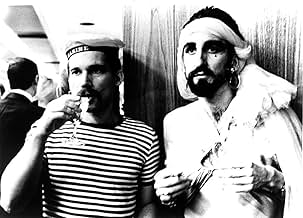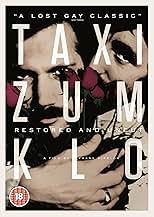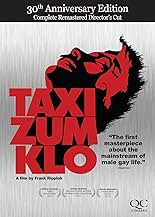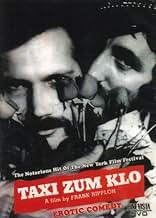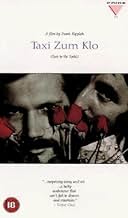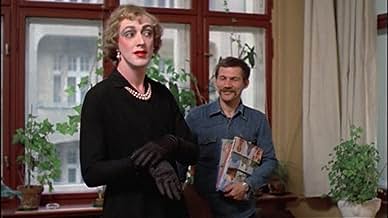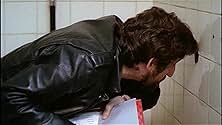If you rebell at even the mildest same-sex love scene, you'd do well to keep your distance from Frank Ripploh's autobiographical TAXI ZUM KLO. Not only is the film shot through with casual male nudity and film clips of vintage pornography, it also contains several extremely explicit sex scenes--including at least one that will cause even the most jaded viewer to wince.
Filmed in Germany in 1981, TAXI ZUM KLO (which translates as "Taxi to the Toilet") is the saga of Frank Ripploh himself--who finds that his job as a school teacher impinges upon his sexual escapades in an annoying sort of way. Pressed for a piece of paper, he writes the telephone number of a potential sexual partner in a student's theme book; determined not to miss a moment, he grades student papers while cruising a public bathroom frequented by like-minded homosexuals. But then Frank meets Bernd (real-life partner Bernd Broaderup), and a one-night stand turns into a relationship in which Frank seems to have it all: handsome, sexy Bernd has eyes for Frank only--and he can even cook.
Up to this point TAXI ZUM KLO maintains a certain eccentric humor that balances distaste with amusement; now, however, we begin to see that Frank is essentially a sex addict, a man who both desires and fears a permanent relationship. As the relationship intensifies, Frank begins to undermine it, turning to casual drug use that fuels an ever-escalating round of sexual extremes. Can Frank maintain his day-time facade as a school teacher? How much is Bernd willing to endure? TAXI ZUM KLO is often described as "an erotic comedy," and when it first made the rounds of art house cinemas and film festivals in the early 1980s it proved an audience favorite and critical darling; even so, the words "erotic" and "comedy" are more than a little dicey. Heterosexuals will have to be incredibly broadminded to find the film erotic, and after a certain point the same becomes true of homosexuals as well, for the sexual escapades become increasingly dark, increasingly disasteful as the film progresses. Much the same is true of the comic elements, which very soon become dark and, by the end of the film, less funny than disturbing and bitter. This is particularly true when one considers that Ripploh's behavior--and the behavior of others like him--fueled the AIDS crisis that exploded in the 1980s not long after this film debuted.
The performances, generally consisting of actors playing themselves, are unstudied yet interesting, and the visual style of the film approximates documentary. Although I do not own the hard-to-find DVD, I have seen it; it has no extras and the picture quality is mediocre at best. I do own the VHS, and while I would not describe that as pristine, I consider it distinctly superior in picture quality. In both cases, however, the subtitles are rendered in white print--and this is unfortunate, for they are often shown against light backgrounds that make them difficult to read.
In closing, I find it difficult to make a recommendation on TAXI ZUM KLO. Over the years I have shown it and loaned it to various friends, and few were able to sit through it from start to finish. Heterosexual viewers who weathered the graphic nature of the film usually found the veneral disease clinic scene a turning point; homosexual viewers endured longer but generally found a urine-laced scene toward the end of the film so distasteful that they stopped the film. Those able to reach the end of the film seemed to feel that its interest was undercut by the very unsympathetic nature of the central character and a considerable "ick" factor.
Ultimately, it probably best to consider TAXI ZUM KLO as a historical portrait of a certain segment of Berlin's pre-AIDS gay community. If you have an interest in that place and time, you will find it worth the effort; if not, you are likely to think the hurdles involved aren't worth the effort. Final word: enter at your own risk.
GFT, Amazon Reviewer

![Trailer [OV]](https://m.media-amazon.com/images/M/MV5BNzE3ZjU3MWMtNTUwNi00NGI3LWE5NDktYzdiYjYyMmJiODQzXkEyXkFqcGdeQXRyYW5zY29kZS13b3JrZmxvdw@@._V1_QL75_UX500_CR0)
